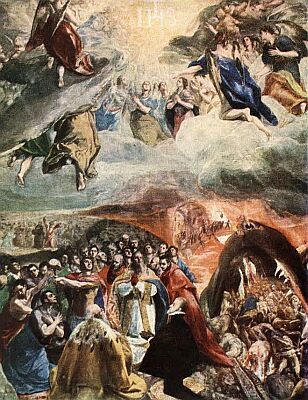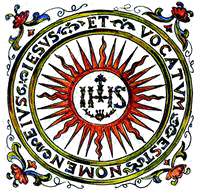From: Hebrews 7:25-8:6
Jesus Christ Is a Priest After the Order of Melchizedek (Continuation)
[25] Consequently he (Jesus) is able for all time to save those who draw near to
God through him, since he always lives to make intercession for them.
[26] For it was fitting that we should have such a high priest, holy, blameless, un-
stained, separated from sinners, exalted above the heavens. [27] He has no need,
like those high priests, to offer sacrifices daily, first for his own sins and then for
those of the people; he did this once for all when he offered up himself. [28] In-
deed, the law appoints men in their weakness as high priests, but the word of the
oath which came later than the law, appoints a Son who has been made perfect
for ever.
Christ Is High Priest of a New Covenant, Which Replaces the Old
[1] Now the point in what we are saying is this: we have such a high priest, one
who is seated at the right hand of the throne of the Majesty in heaven, [2] a mini-
ster in the sanctuary and the true tent which is set up not by man but by the
Lord. [3] For every high priest is appointed to offer gifts and sacrifices; hence it
is necessary for this priest also to have something to offer. [4] Now if he were on
earth, he would not be a priest at all, since there are priests who offer gifts accor-
ding to the law. [5] They serve a copy and shadow of the heavenly sanctuary; for
when Moses was about to erect the tent he was instructed by God, saying, “See
that you make everything according to the pattern which was shown you on the
mountain.” [6] But as it is, Christ has obtained a ministry which is as much more
excellent than the old as the covenant he mediates is better, since it is enacted
on better promises. [7] For if that first covenant had been faultless, there would
have been no occasion for a second.
[8] For he finds fault with them when he says: “The days will come, says the
Lord, when I will establish a new covenant with the house of Israel and with the
house of Judah.
*********************************************************************************************
Commentary:
23-25. Christ’s priesthood is everlasting. Just as Melchizedek had no “end of
life”, so too the Son of God holds his priesthood permanently. The Levites are
mere mortal men; Christ, however, has not been instituted as priest by “bodily
descent but by the power of an indestructible life” (v. 16); that is why he can
truly be said to be a priest “for ever”. This makes sense, for death is a conse-
quence of sin, and Christ has conquered sin and death. Moreover, death makes
it necessary for there to be a succession of human priests in order to provide
continuity; whereas the everlasting character of Christ’s priesthood renders any
further priesthood unnecessary.
St Thomas comments that this shows Christ to be the true and perfect Priest
in the strict sense of the word, for it was impossible for the Jewish priests to be
permanent mediators because death naturally deprived them of their priesthood.
The case of Christian priests is quite different, because they are not mediators
strictly speaking. There is only one Mediator, Jesus Christ; they are simply re-
presentatives of his, who act in his name. Christ is to the Levites as the perfect
(which is necessarily one) is to the imperfect (which is always multiple): “Incor-
ruptible things have no need to reproduce themselves [...]. Christ is immortal.
As the eternal Word of the Father, he abides forever: his divine eternity is
passed on to his body, for ‘being raised from the dead (he) will never die again’
(Rom 6:9). And so ‘because he continues for ever, he holds his priesthood per-
manently.’ Christ alone is the true Priest; the others (priests) are his ministers”
(”Commentary on Heb., ad loc.”).
The eternal character of Christ’s priesthood, St John Chrysostom points out,
gives us reason for great confidence: “It is as if the Apostle were saying, ‘Do
not be afraid or think that (although) he loves us and has the Father’s full confi-
dence he cannot live forever on the contrary, he does live forever!”’ (”Hom. on
Heb.”, 13). We can put our trust in Christ the Priest because his priesthood is
an enduring expression of his heartfelt love for all mankind: “The living Christ
continues to love us still; he loves us today, now, and he offers us his heart as
the fountain of our redemption: ‘he always lives to make intercession for (us)’
(Heb 7:25). We are always—ourselves and the entire world—embraced by the
love of this heart ‘which has loved men so much and receives such poor re-
sponse from them”’ (John Paul II, “Hom. in Sacre Coeur”, Montmartre, Paris,
1 June 1980).
Christ’s priesthood is an expression of his Love, from which it cannot be separa-
ted; since his Love is everlasting, so too is his priesthood. In the first place, his
priesthood is everlasting because it is linked to the Incarnation, which is some-
thing permanent; secondly, because Christ’s mission is that of saving all men in
all periods of history and not simply one of helping them by his teaching and his
example; thirdly, because Christ continues to be present—St Ephraem says—not
in the victims of the sacrifices of Mosaic worship, but in the prayer of the Church
(cf. “Com. in Epist. ad Haebreos, ad loc.”), particularly in the permanent efficacy
of the sacrifice of the Cross constantly renewed in the Mass, and in the praying
of the Divine Office. Finally, it is everlasting because Christ’s sacrifice is perpe-
tuated until the end of time in the Christian ministerial priesthood, for bishops
and priests “in virtue of the sacrament of Order, are consecrated as true priests
of the New Testament to preach the Gospel and shepherd the faithful and cele-
brate divine worship” (Vatican II, “Lumen Gentium”, 28).
Christ not only interceded for us when he was on earth: he continues to make in-
tercession for us from heaven: “This ‘always’ points to a great mystery,” St John
Chrysostom observes; “he lives not only here but also there, in heaven; not only
here and for a while, but also there, in life eternal” (”Hom. on Heb.”, 13). In sa-
ying that Christ “makes intercession” for us, the inspired text is saying that
Christ “takes the initiative, addresses the Father, presents him with a request
or a demand”, as if Christ were an advocate before the Father, a help, a defen-
der (a “Paraclete”: cf. 1 Jn 2:1). But in what sense does he continue to make
intercession for us, given that he cannot merit any more than he did when he
was on this earth? He intercedes, St Thomas replies, first by again presenting
his human nature to the Father, marked with the glorious signs of his passion,
and then by expressing the great love and desire of his soul to bring about our
salvation (cf. “Commentary on Heb.”, 7, 4). Christ, so to speak, continues to
offer the Father the sacrifice of his longsuffering, humility, obedience and love.
That is why we can always approach him to find salvation. “Through Christ and
in the Holy Spirit, a Christian has access to the intimacy of God the Father, and
he spends his life looking for the Kingdom which is not of this world, but which
is initiated and prepared in this world. We must seek Christ in the Word and in
the Bread, in the Eucharist and in prayer. And we must treat him as a friend, as
the real, living person he is—for he is risen. Christ, we read in the Epistle to the
Hebrews [Heb 7:24-25 follows]” (St J. Escriva, “Christ Is Passing By”, 116).
26-28. These last verses form a paean in praise of Christ, summing up and roun-
ding off what has gone before. Christ is proclaimed to be “holy, blameless, un-
stained,” that is, sinless, totally devoted to God the Father, just and faithful. Sa-
cred Scripture uses similar language to describe people of outstanding holiness,
such as Zechariah and Elizabeth (cf. Lk 1:6), Simeon, who was “righteous and
devout”, Joseph of Arimathea (cf. Lk 23:50), the centurion Cornelius (cf. Acts
10:22), etc. The praise given Christ here, however, hints at a perfection which is
more than human. Christ is, at the same time, “separated from sinners”, not in
the sense that he refuses to have any dealings with them or despises them, for,
on the contrary, we know that the Pharisees abused him, saying, “Behold, a
glutton and a drunkard, a friend of tax collectors and sinners” (Mt 11:19) and
“This man receives sinners and eats with them” (Lk 15:2; cf. Mt 9-11:13 and
par.; Lk 7:34); he is “separated from sinners” because he can have no sin in
him, since the presence of sin in his human nature is absolutely incompatible
with the holiness of the unique person that Christ is—the divine Word. He is the
perfect embodiment of all the ancient prerequisites for a priest of the true God
(cf. Lev 21:4, 6, 8, 15). Christ, finally, from the point of view of his human nature
also, has been “exalted above the heavens” not only ethically speaking, by
virtue of his sublime holiness, but also in his very body, through his glorious
ascension (cf. Acts 2:33-26; 10:42); he is therefore the “Son who has been
made perfect forever”.
“Who was Jesus Christ?” St Alphonsus asks himself. “He was, St Paul replies,
holy, blameless, unstained or, even better, he was holiness itself, innocence it-
self, purity itself’ (”Christmas Novena”, 4). And St Fulgentius of Ruspe extols
Christ in these beautiful terms: “He is the one who possessed in himself all that
was needed to bring about our redemption, that is, he himself was the priest and
the victim; he himself was God and the temple—the priest by whose actions we
are reconciled; the sacrifice which brings about our reconciliation; the temple
wherein we are reconciled; the God with whom we have been reconciled.
Therefore, be absolutely certain of this and do not doubt it for a moment: the
only-begotten God himself, the Word made flesh, offered himself to God on our
behalf in an odor of sweetness as sacrifice and victim—the very one in whose ho-
nor as well as that of the Father and the Holy Spirit the patriarchs, prophets and
priests used to offer sacrifices of animals in Old Testament times; and to whom
now, that is, in the time of the New Testament, in the unity of the Father and the
Holy Spirit, with whom he shares the same unique divinity, the holy Catholic
Church never ceases to offer on behalf of the entire universe the sacrifice of the
bread and wine, with faith and charity” (”De Fide Ad Petrum”, 22).
The sublimity of Christ’s priesthood is a source of encouragement, hope and holy
pride for the priests of the New Testament, given that “every priest in his own way
puts on the person of Christ and is endowed with a special grace. By this grace,
the priest, through his service of the people committed to his care and all the peo-
ple of God, is able the better to pursue the perfection of Christ, whose place he
takes. The human weakness of his flesh is remedied by the holiness of him who
became for us a high priest, ‘holy, blameless, unstained, separated from sinners’
(Heb 7:26)” (Vatican II, “Presbyterorum Ordinis”, 12). For all these reasons St
Pius X, addressing priests, wrote: “We ought, therefore, to represent the person
of Christ and fulfill the mission he has entrusted to us; and thereby attain the end
which he has set out to reach [...]. We are under an obligation, as his friends, to
have the same sentiments as Jesus Christ, who is ‘holy, blameless, unstained’
(Heb 7:26). As his ambassadors we have a duty to win over men’s minds to ac-
cept his law and his teaching, beginning by observing them ourselves; insofar as
we have a share in his power, we are obliged to set souls free from the bonds of
sin, and we must ourselves be very careful to avoid falling into sin” (St Pius X,
“Haerent Animo”, 5).
1-2. The key point of the epistle is now proclaimed with great formality—the su-
periority of Christ’s priesthood. This links up what was already said in 1:3 (about
Christ being enthroned at the right hand of the Majesty) with what will be deve-
loped in chapters 9 and 10 (about the new temple and new form of worship). In
Christ the Old Covenant, which offered worship by means of sacrifice and offe-
rings, finds its total perfection; from Christ onwards the New Covenant begins,
with a new sacrifice and a new temple. Little by little, consideration of the priest-
hood of the Mosaic form of worship gives way to examination of Christ’s new
form of divine service.
It is not just a matter of one temple or stone being replaced by another or by ma-
ny such temples. The old temple has given way to a heavenly sanctuary, heaven
itself. This is why Christ’s ascension and enthronement at the right hand of the
Father is so important: it marks the definitive entry of Jesus Christ’s sacred hu-
manity into his true temple, one not made by human hands. This makes it easier
to understand the sense in which the temple of Jerusalem and the worship con-
nected with it were a foreshadowing of future events.
Christ, then, possesses the true, definitive priesthood, for he exercises his minis-
try in the sanctuary of heaven, where he is seated at the right hand of the Father.
This heavenly ministry of Christ is a further confirmation of the superiority of his
priesthood. Firstly, because he is seated at the right hand of the Majesty in hea-
ven (cf. Ps 110:1)—”Majesty” meaning the Godhead itself, for it is a way of refer-
ring to God (cf. the “throne of grace” in 4:16). Moreover, the “throne of the Majes-
ty” is the equivalent of supreme authority to rule and judge. This can be seen
from descriptions of the Last Judgment: “When the Son of man comes in his
glory, and all the angels with him, then he will sit on his glorious throne” (Mt 25:
31; cf. Rev 3:21; 20:11; Mt 19:28; etc.). Secondly, Christ carries out his ministry
in a new sanctuary and a new tabernacle (”tent”), which are “true” in the sense
that the sanctuary and tabernacle of Moses were only an “image” of them. The
earthly liturgy is a reflection of the true, heavenly liturgy, which is the eternal con-
tinuation of Christ’s priesthood in the presence of the Father, for “in the earthly
liturgy we take part in a foretaste of that heavenly liturgy which is celebrated in
the Holy City of Jerusalem toward which we journey as pilgrims, where Christ is
sitting at the right hand of God, Minister of the holies and of the true tabernacle”
(Vatican II, “Sacrosanctum Concilium”, 8).
Some Fathers see the true sanctuary and tabernacle as representing the Church,
in its total sense of Church militant plus Church triumphant. And St Cyril of Ale-
xandria, for example, points out in one of his works that “the old tabernacle was
set up in the desert by Moses and it was highly suitable for performing all the
sacred ceremonies of the Law. But the mansion which is appropriate to Christ is
the city on high, that is, heaven, the divine tent which is not the product of human
handiwork but rather something holy and begotten by God. Christ, established
therein, offers to God the Father those who believe in him, those sanctified by the
Spirit” (St Cyril, “Explanation of Heb.”).
3-6. To compare the earthly and heavenly tabernacles, the author resorts to ana-
logy and metaphor, which is all that he can do. Bearing this in mind, one should
not interpret the words of this passage as meaning that Jesus Christ consumma-
ted his sacrifice only in heaven, for the sacrifice of Calvary happened only once
and was complete in itself. What this passage is saying is that, in heaven, Christ,
the eternal Priest, continuously presents to the Father the fruits of the Cross. In
the New Covenant there is only one sacrifice—that of Jesus Christ on Calvary; this
single sacrifice is renewed in an unbloody manner every day in the sacrifice of the
Mass; there Jesus Christ the only Priest of the New Law — immolates and offers,
by means of priests who are his ministers, the same victim (body and blood)
which was immolated in a bloody manner once and for all on the Cross.
7-12. The comparison between the two covenants, the Old made with Moses and
written on stone, and the New, engraved on the minds and hearts of the faithful (cf.
2 Cor 3:3; Heb 10:16, 17) is developed with the help of a quotation from Jeremiah
(Jer 31:31-34), where the prophet announces the spiritual alliance of Yahweh with
his people. Jeremiah’s words, quoted from the Greek translation (very close to the
riginal Hebrew), refer directly to the restoration of the Jews after the Exile. Now
that the chosen people have been purified by suffering they are fit to be truly the
people of God: “I will be their God, and they shall be my people”; this promise of
intimate friendship is the core of the prophecy. That is what it means when it
says the Law will be written on the minds and hearts of all, and all even the least
— shall know God. It may be that Jeremiah sensed the messianic restoration that
lay beyond the restoration of the chosen people on its return from exile; certainly
we can see that this oracle finds its complete fulfillment only with the New Cove-
nant: the return from Babylon was merely an additional signal/symbol of the per-
fect Covenant which Christ would establish. For it is in that New Covenant that
God truly forgives sins and remembers them no more.
The Old Covenant is said not to have been faultless, or sinless. This does not
mean it was bad; rather; as St Thomas explains, it was powerless to atone for
sins, it did not provide people with the grace to avoid committing sins, it simply
showed people how to recognize sins, those who lived under the Old Law conti-
nued to be subject to sin (cf. “Commentary on Heb.”, 7, 2).
*********************************************************************************************
Source: “The Navarre Bible: Text and Commentaries”. Biblical text from the
Revised Standard Version and New Vulgate. Commentaries by members of
the Faculty of Theology, University of Navarre, Spain.
Published by Four Courts Press, Kill Lane, Blackrock, Co. Dublin, Ireland, and
by Scepter Publishers in the United States.
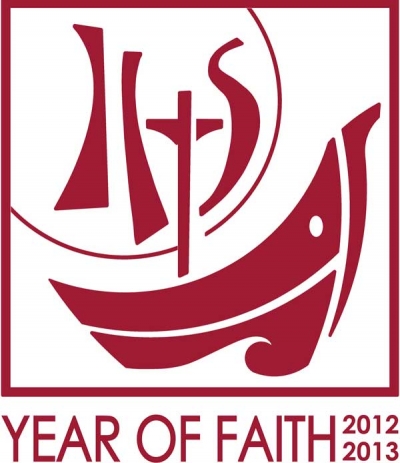
 The following is the longer version of the vital prayer composed by Pope Leo XIII in 1888 after his startling vision as to the future of the Church. This prayer was dedicated for the Feast of St. Michael 1448 years from the date of the election of the first Leo - Pope Saint Leo the Great. Everyone is familiar with the first prayer below which was mandated by His Holiness as part of the Leonine Prayers after Low Mass. Below are both the short and longer versions of this poignant prayer which should never be forgotten.
The following is the longer version of the vital prayer composed by Pope Leo XIII in 1888 after his startling vision as to the future of the Church. This prayer was dedicated for the Feast of St. Michael 1448 years from the date of the election of the first Leo - Pope Saint Leo the Great. Everyone is familiar with the first prayer below which was mandated by His Holiness as part of the Leonine Prayers after Low Mass. Below are both the short and longer versions of this poignant prayer which should never be forgotten. 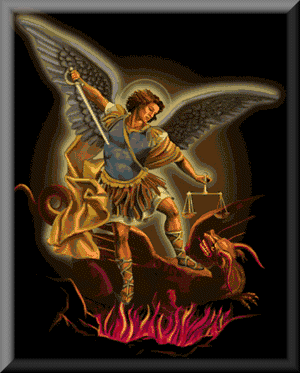
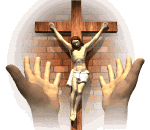 Look down upon me, O good and gentle Jesus, while before Thy face I humbly kneel, and with burning soul pray and beseech Thee to fix deep in my heart lively sentiments of faith, hope and charity, true contrition for my sins, and a firm purpose of amendment; the while I contemplate with great love and tender pity Thy five most precious wounds, pondering over them within me, calling to mind the words which David Thy prophet said of Thee, my good Jesus: "They have pierced My hands and My feet; they have numbered all My bones."
Look down upon me, O good and gentle Jesus, while before Thy face I humbly kneel, and with burning soul pray and beseech Thee to fix deep in my heart lively sentiments of faith, hope and charity, true contrition for my sins, and a firm purpose of amendment; the while I contemplate with great love and tender pity Thy five most precious wounds, pondering over them within me, calling to mind the words which David Thy prophet said of Thee, my good Jesus: "They have pierced My hands and My feet; they have numbered all My bones." 

